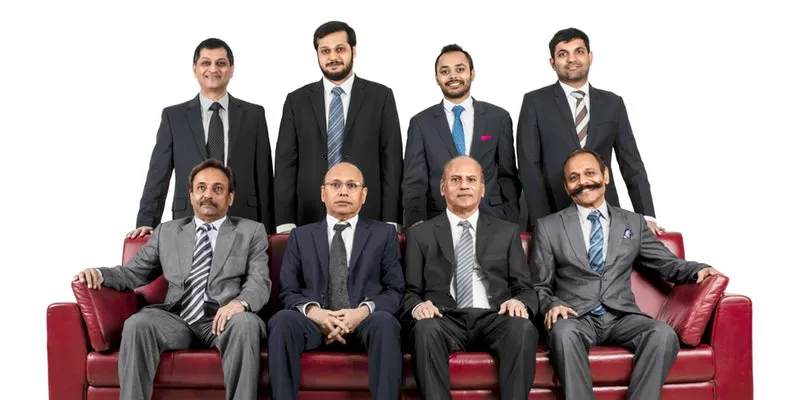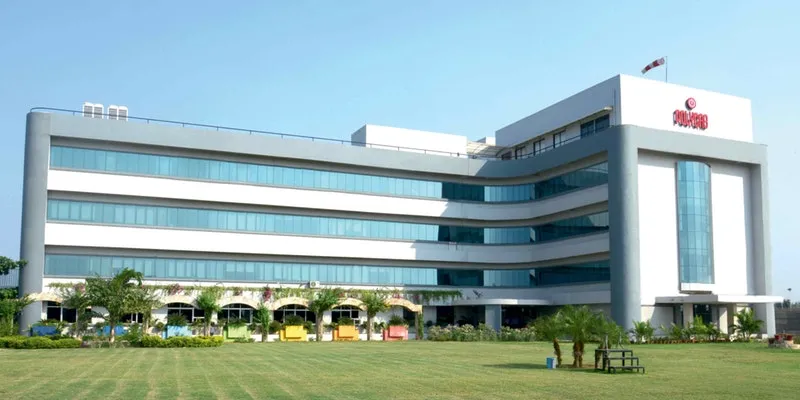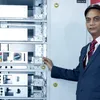From a small hardware store, this entrepreneur and his brothers built a Rs 7,985 Cr cables and wires company
Cables and wires and electrical products company Polycab was started in 1983 by Inder Jaisinghani and his brothers, who took over their late father’s hardware and electrical store.
Inder Jaisinghani was 15-years-old when his father Thakurdas Jaisinghani passed away. It was 1968 and his mother asked Inder to quit his studies and take over the family business started by his father.
The Jaisinghani family, who are Sindhis, ran Sind Electric Stores, a small hardware and electrical store in Mumbai, which sold fans, lights, switches, and wires. It was located in Lohar Chawl – Mumbai’s epicentre for electrical goods and products, and a trading zone.
Fortunately for young Inder, he was not alone when he took over the business.
His older brothers Girdhari and Ajay, and his younger brother Ramesh teamed up to scale up the family business and take their father’s legacy forward.
“As Sindhis, we always wanted to be entrepreneurs and build our family’s name. We decided to set the foundation of a robust and dynamic business and leverage the strengths of our family members,” Inder tells SMBStory.
Initially, Inder and his brothers ran the store and experimented with making wires and cables in Mumbai.
But their real success story began in 1983 when they started a firm named Polycab to manufacture electrical goods at a large scale in Gujarat. It was registered as an industrial unit by the Directorate of Industries, Government of Gujarat.

Inder Jaisinghani, Chairman and Managing Director, Polycab
Learning from struggle
Polycab’s initial years were rife with struggle and sacrifices as the brothers built the business organically.
First, they set up a factory at Halol in Gujarat for manufacturing and processing PVC insulated wires and cables as well as copper, bare copper, and aluminium wire.
“We had to think big and differently. With Polycab, we believed in the power of manufacturing and invested in it to grow bigger. Since we had to pick up the nuances of the business, we had to learn quickly and from everyone around, including our father’s friends,” Inder says.
Inder and his brothers’ mantra was “money makes money”. They ploughed back the major share of profits into Polycab. They kept some in reserves, and invested the rest.
Inder was happy with the concept in theory, but in reality, things were difficult. Capital was a huge challenge in Polycab’s early days.
“Resources were scarce, but we believed in the adage, ‘where there’s a will, there’s a way’. We kept setting difficult targets and stretched ourselves. We felt this perseverance would eventually lead to things opening up and Polycab growing bigger,” Inder says.
The brothers were never given anything on a silver platter, and had to learn valuable business lessons the hard way. Their strategy for organic growth meant they had to learn how to become more profitable without compromising Polycab’s quality and service.
“We had to integrate our business strategies, both forward and backward, to ensure our margins improved consistently and gave us more cash in hand. It was tough, but we managed to get traction slowly but surely,” he says.

The Polycab leadership team
Diversifying the product portfolio
At their Halol facility, the brothers manufactured wires and cables, power cables, control cables, building wires, and communication cables. They made wires and cables in accordance with Indian and international standards. They also made customised products for some customers, based on their requirements and specifications.
“We made a diverse range of wires, and cables used for various needs such as power, instrumentation, solar use, communication, welding, submersible flat and round cables, rubber, overhead conductors, railway signals, speciality cables, control cables, building wires, flexible/single multi-core cables, and more,” Inder explains.
These Polycab wires and cables were widely distributed in electrical stores across the country. The wires and cables, based on their type, found applications in overhead, underground and submarine power transmission and distribution systems, building electrification in various industries, and in sectors such as marine, oil and gas, and space stations.
They were also used in household appliances such as power supply for refrigerators and air conditioners.
In 2009, the company diversified into the Engineering, Procurement and Construction (EPC) business, which includes the design, engineering, supply, execution and commissioning of power distribution and rural electrification projects.
“Then, as our reputation as a brand with high-quality products grew, we realised there was a gap in the market for premium quality consumer electrical products. Our traders and dealers also echoed this need. In 2014, we decided to go ahead and start manufacturing electric fans, LED lights, switches and switchgears, conduits, solar products, and other electrical accessories,” Inder says.
This venture into the Fast Moving Electrical Goods (FMEG) sector saw Polycab’s products being used in panels, street lights, floodlights, open area lighting in homes, restaurants, call centres, hotels, retail stores, banks, hospitals, residential colonies, parks, industrial facilities, and offices. The list was endless.

Polycab's manufacturing unit in Halol
Manufacturing
Today, Polycab prides itself with having 25 manufacturing facilities, including its joint ventures with LED products maker Techno Electromech and commodity trading company Trafigura, located across Gujarat, Maharashtra, Uttarakhand and Daman and Diu.
The brothers’ primary focus was on producing quality complex electrical products on short timeframes to meet their customers’ needs.
“Our emphasis was on upgrading the technology used in our production process, customer-centric R&D efforts in Halol, and in assisting our sales and marketing team in understanding our customers’ requirements. We believe that our R&D efforts have helped us solve the technical problems that our customers faced,” Inder says.
Polycab has adopted automation systems in its manufacturing process, such as the Manufacturing Execution System (MES) - an automated sensor base system for recording the actual consumption of raw materials in production.
The company also adopted Enterprise Resource Planning (ERP) systems as well as Maynard Operation Sequence Technique (MOST) to increase productivity and optimise capacity utilisation.
Inder and his brothers also established a supply chain through their network of authorised dealers, distributors and retailers. This network supplies Polycab’s products across India.
“Our distribution network in India comprises over 3,450 authorised dealers and distributors and 29 warehouses as of 2018. We supply our products directly to our authorised dealers and distributors, who, in turn, supply our products to over 1,25,000 retail outlets in India. We manage our sales and marketing activities through our corporate office, three regional offices and 20 local offices in various parts of India,” he explains.

Polycab's product range
Road ahead
Inder and his brothers have come a long way with Polycab, but they have not forgotten what inspired them to work hard in the early days. Their desire to enhance the Jaisinghani family name still burns strong.
The brothers want to take Polycab beyond its current Rs 7,985 revenue and 4,600 employees.
They want to strengthen the company's leadership position in the wires and cables industry. The brothers want to expand Polycab’s market share by targeting key growth sectors such as mining, oil and gas, shipping, power, renewables, infrastructure, construction, automotive, telecommunication and agriculture.
“We also want to grow and strengthen our market position in the FMEG sector in India. We will do so by further building our brand, distribution network, diverse customer base and manufacturing capabilities. We are also undertaking detailed market mapping to identify and appoint new channels for geographical expansion,” Inder says.
Polycab is competing in a rapidly growing market and faces competition from other manufacturers, traders, suppliers and importers of electrical equipment.
It is aiming to grow even bigger in an industry where suppliers compete based on key attributes, including technical competence, product quality, strength of sales and distribution network, pricing, and timely delivery.
(Edited by Javed Gaihlot)










